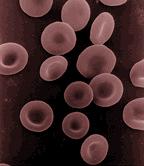US scientists have developed a method to pluck circulating cancer cells from the bloodstream so that they can be analysed to monitor a patient's response to treatment. The device, which has been Massachusetts General Hospital researcher Daniel Haber and his team and is presented in the New England Journal of Medicine, is a microfluidic device called a CTC-chip, short for circulating tumour cell chip. It contains 78,000 'microposts' coated in an antibody that locks onto cells bearing a lung cell marker called EpCAM - epithelial cell adhesion molecule.
 The team obtained 10ml blood samples from 27 patients with non-small cell lung cancers and fed the samples into the CTC-chip device, which sucessfully grabbed onto just the cancer cells in the sample. By extracting the cells and then genetically analysing them the team were then able to determine whether the tumours carried by the patients would be susceptible to specific chemotherapy agents such as newer classes of drugs called receptor tyrosine kinase antagonists (TKAs), including gefitinib and erlotinib, which target the epidermal growth factor receptor commonly mutated in non small cell lung cancers. The technique also means that patients who are already on treatment can be monitored non-invasively for signs of developing drug resistance so that their drug regimen can be switched or better tailored to their needs.
The team obtained 10ml blood samples from 27 patients with non-small cell lung cancers and fed the samples into the CTC-chip device, which sucessfully grabbed onto just the cancer cells in the sample. By extracting the cells and then genetically analysing them the team were then able to determine whether the tumours carried by the patients would be susceptible to specific chemotherapy agents such as newer classes of drugs called receptor tyrosine kinase antagonists (TKAs), including gefitinib and erlotinib, which target the epidermal growth factor receptor commonly mutated in non small cell lung cancers. The technique also means that patients who are already on treatment can be monitored non-invasively for signs of developing drug resistance so that their drug regimen can be switched or better tailored to their needs.
This approach would also avoid the need to perform procedures like lung biopsies, which can carry significant risks of bleeding, lung puncture and infection.
"If tumour genotypes don't remain static during therapy, it's essential to know what you are treating at the time you are treating it," says Haber. "Biopsy samples taken at the time of diagnosis can never tell us about changes emerging during therapy or genotypic differences that may occur in different sites of the original tumour, but the CTC-chip offers the promise of non-invasive cancer monitoring."










Comments
Add a comment